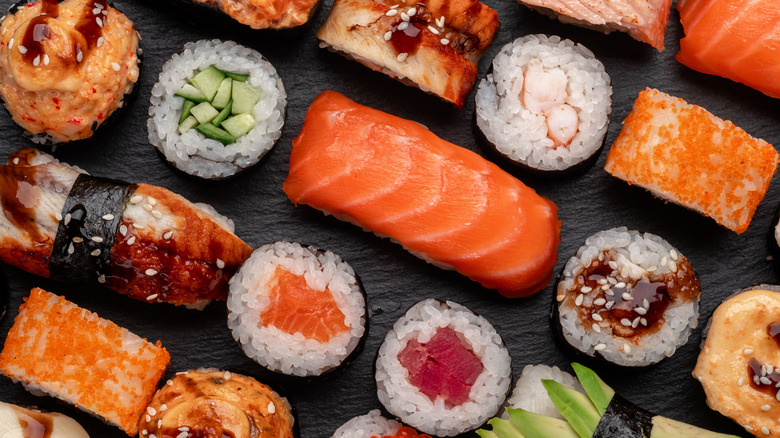This Is What Happens When You Eat Sushi Every Day
Sushi is a Japanese dish consisting of rice seasoned with vinegar and garnished with seafood or vegetables. Sushi is incredibly versatile and comes in many different styles, some of which are healthy while others are more indulgent. Many traditional sushi recipes contain raw slices of fish like salmon, tuna, and mackerel. These types of fish contain EPA (eicosapentaenoic acid) and DHA (docosahexaenoic acid), which are omega-3 fatty acids that are important for a healthy heart (via Eating Well). Fish also contains protein, which can help you stay full after eating, and nutrients like vitamin D, vitamin B12, selenium, zinc, and iodine.
Vegetables are commonly added to sushi rolls. Cucumber is a popular ingredient, but you'll often see other veggies like carrots, sweet potatoes, mushrooms, and peppers on the menu at a sushi restaurant. Vegetables are low in calories and packed with important nutrients like fiber, vitamin C, vitamin A, potassium, and folate (via MyPlate). Avocado is another popular sushi ingredient that contains fiber, healthy fats, and many vitamins and minerals.
Some types of sushi are healthier than others
Although sushi made with fish and vegetables is a great health choice, not all sushi is created equal. For example, "rolls dipped in tempura and fried [and] then covered with a creamy sauce will not be the same as those wrapped solely in nori and packed with fish, rice and vegetables," Marisa Moore, RDN, a registered dietitian nutritionist based in Atlanta, told Health. You should also avoid eating too much sushi with ingredients like cream cheese, tempura shrimp, and mayo-based sauces.
Between the seasoned rice, seaweed, and soy sauce for dipping, sushi often has a high sodium content. Too much sodium can lead to high blood pressure, heart attack, stroke, and heart failure. White rice, which is the primary ingredient in sushi, is also high in carbs. A diet high in refined carbs has been linked to type 2 diabetes, high blood pressure, and high insulin levels.
Like many versatile foods, sushi can be a healthy lunch or dinner option when you choose rolls made with lean fish and vegetables. And while deep-fried rolls shouldn't be a staple in your diet, they're fine to enjoy in moderation.


